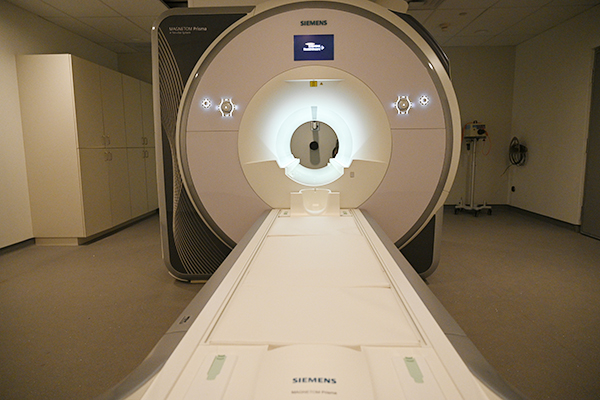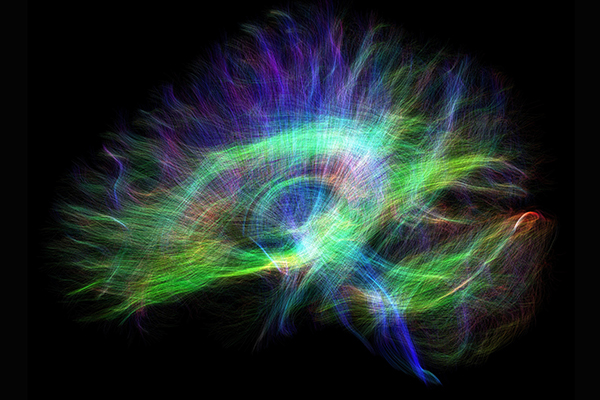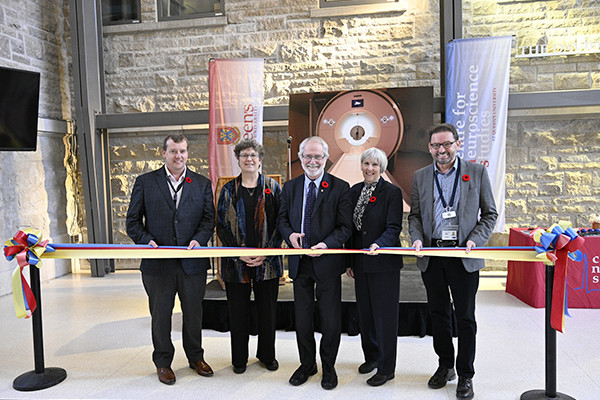
The Centre for Neuroscience Studies recently unveiled its state-of-the-art MRI machine, a Siemens Magnetom 3T Prisma, the most powerful 3 Tesla whole body MRI on the market.
Keeping up with the fast pace of technological advancements in the neuroimaging field, the Centre for Neuroscience Studies (CNS) at Queen's University recently unveiled the latest state-of-the-art MRI machine, the Siemens Magnetom 3T Prisma. The Prisma is a next generation, whole-body scanner and is a major upgrade to the centre's current system.
"A research-dedicated MRI facility is an essential component to any research-intensive neuroscience program, allowing investigators to study the structure and function of the living human brain in remarkable detail," says Dr. Roumen Milev, Director of the CNS. "This is the most powerful 3 Tesla MRI on the market, allowing for high precision imaging of smaller tissues and enhanced tracking of brain connectivity."

Using the Centre for Neuroscience Studies' new Prisma MRI, 30,000 white matter tracts are revealed through diffusion spectrum imaging (DSI).
With the support of the Canadian Foundation for Innovation, the CNS MRI facility first became operational in 2005. Over the last 14 years, approximately 6,000 participants have been imaged for over 140 different research projects - leading to hundreds of research papers and important findings.
Research goals have spanned the spectrum from answering important fundamental questions about brain function and organization, to large multi-site studies searching for biomarkers of disease, to industry-sponsored clinical trials. A wide variety of disorders and diseases have been studied, including Alzheimer's disease, Parkinson's disease, Amyotrophic Lateral Sclerosis (ALS), epilepsy, Attention Deficit Hyperactivity Disorder (ADHD), Fetal Alcohol Spectrum Disorders (FASD), spinal cord injury, and fibromyalgia.
"In recent years, the facility has been an integral part of many large multi-site initiatives, involving partners such as the Ontario Brain Institute (OBI) and Kids Brain Health Network (KBHN)," says Dr. Milev, speaking to direct patient impact. "These initiatives allow us to collect large numbers of participants throughout Ontario and the country, exploring the brain mechanisms that underlie neurodevelopment, neurodegeneration, and neuropsychiatric illness, and potentially finding biomarkers of related disorders. These studies impact not only our understanding of the biology of these disorders, but lead to the formulation of early detection tests, as well as translating our research to the clinic."
The CNS MRI Facility has also recently been renovated, outfitting the facility with high-performance computers and cutting-edge monitoring equipment and devices.
"The new facility will allow us to be competitive with any imaging centre in the world for the next decade and beyond and help further cement Queens' reputation as a top-tier center for neuroscience research" Dr. Milev adds.
For more information visit the CNS website.

The Centre for Neuroscience Studies recently installed a state-of-the-art MRI system, the Siemens Magnetom 3T Prisma. A special ribbon cutting brought together: Christopher Simpson Vice Dean (Clinical), School of Medicine; Jill Atkinson, Associate Dean, Faculty of Arts and Science; Patrick Deane, Principal and Vice-Chancellor; Kim Woodhouse, Interim Vice-Principal (Research); and Roumen Milev, Director, Centre for Neuroscience Studies. (Supplied photo)









